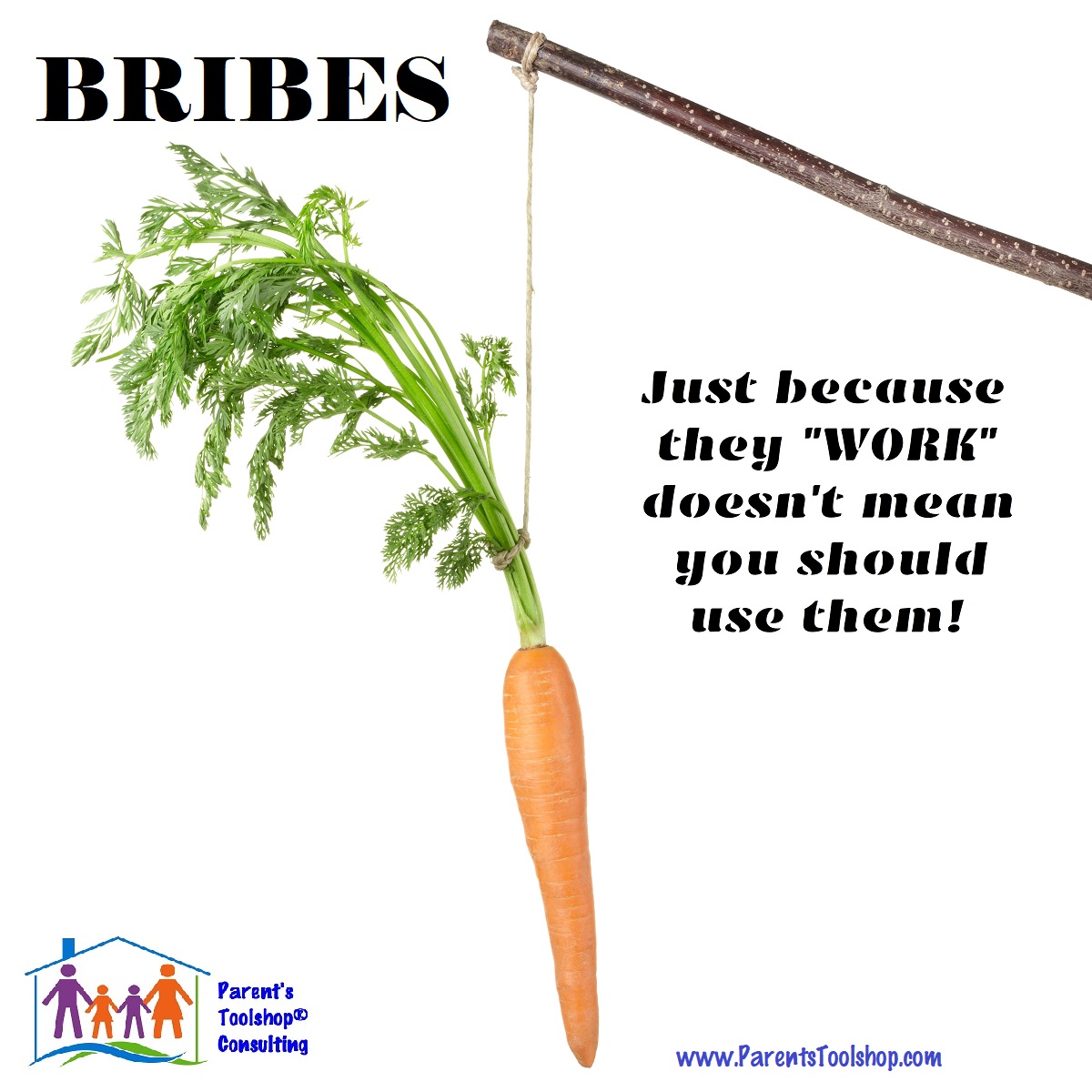“Come on, Johnny! P-L-E-A-S-E!?”
… {PAUSE} … {repeat 3-10 times} …
“I’ll give you a ______ if you do it!”
Many parents reward children’s good behavior or use bribes to entice children to cooperate. Such rewards can easily turn into bribes. Bribes are gifts or payments which manipulate or influence someone to take a particular action. Rewards pay children for behaving in a desirable way.
Most parents bribe their children because they want to distract the child and get the child to buy into what the parent wants the child to do. Most parents find it’s convenient and usually works– in the short run. But it quickly becomes addictive for the child and ineffective for the parent. Parents need to look at the long term messages they are sending and decide whether these are the lessons they intend to teach.
Parents often give psychological and material rewards to reinforce wanted behavior. Praise sends the message that in order to get approval, love, acceptance, or to be considered “good” a child must do what they are told to do.Such external, superficial, and conditional love results in children becoming dependent on others’ opinions for their self-worth. A more encouraging attitude is to teach children acceptable behavior like any other skill — view mistakes as part of the learning process. Sincere descriptions of a child’s acceptable behavior and the value of their contributions will lead children to conclude for themselves that they feel good inside when they are helpful. Such internal satisfaction is a greater reward than any external compliment or payoff, which can be canceled out with criticisms or punishments.
Material rewards such as toys and money teach children that they should behave to get a payoff. Food rewards teach children to use food for purposes other than nourishment of the body. Rewards can become a weapon, for both parents and children. Most parents would agree that they want their children to cooperate because something needs doing, because they are part of the family, or because it’s the responsible thing to do.
Truly, children want to cooperate and feel helpful, but they don’t like to be tricked. Children catch on quickly if someone is manipulating them. They may resist cooperating if they think that doing what parents ask is a sign of giving in.They might also use the parent’s tendency to bribe to their advantage by refusing to cooperate unless they get a payoff.
To tell if you’re bribing or motivating a child, look at two things:
- What is your motive? If you are trying to manipulate, you are probably bribing.
- Who is suggesting the trade-off? Usually, when parents suggest, “If you’ll do something for me, then I’ll do something for you,” children interpret it as a bribe. If children ask if they can have something and the parents responds with the condition under which they can have it, it teaches values such as “work before play” or “healthy food before sweets.“
Generally, “If ___, then ___.” statements tend to come off more like bribes. For example, “If you eat your peas I’ll give you some delicious dessert.” “If you finish cleaning your room, you can play with John.” If parents say, “When (or “As soon as. . .”)___ then ___,” children are less likely to misconstrue the statement as a bribe. For example, “When you have eaten your healthy food, you can have some dessert if you like.” “As soon as your room is clean, you can play with John.”
Parents want to teach children that their behavior is a choice. Each choice has an outcome and most privileges have a counterbalanced responsibility. Even a small change in the wording can alter the long-term lesson children learn.
Many times there is not much difference between rewarding good behavior, behavior charts, and bribery. Next month, we’ll explore the differences and some guidelines to follow should you choose to use behavior charts. (Refer to my July and August articles for other tools to engage cooperation without bribery.)
If you want more insights, information and practical tools and tips about [not] using rewards, behavior charts, and other forms of “behavior modification”:
|
Jody Johnston Pawel, LSW, CFLE is President of Parent’s Toolshop® Consulting, where she oversees an international network of Toolshop® trainers. For 30+ years, Jody has trained tens thousands of parents and family professionals worldwide through her dynamic workshops and interviews with the media worldwide, including Parents and Working Mother magazines, and serving as the Co-Producer and Parenting Expert for the Emmy-nominated Ident-a-Kid television series. She is the author of the award-winning book, The Parent’s Toolshop® and countless multimedia resources that support and educate parents from diverse backgrounds and needs, and other adults who live or work with children. You can find them at her award-winning website, www.ParentsToolshop.com.
Reprint Guidelines: You may publish/reprint any article from our site for non-commercial purposes in your ezine, website, blog, forum, RSS feed or print publication, as long as it is the entire un-edited article and title and includes the article’s source credit, including the author’s bio and active links as they appear with the article. We also appreciate a quick note/e-mail telling us where you are reprinting the article. To request permission from the author to publish this article in print or for commercial purposes, please complete and send us a Permission to Reprint Form.



